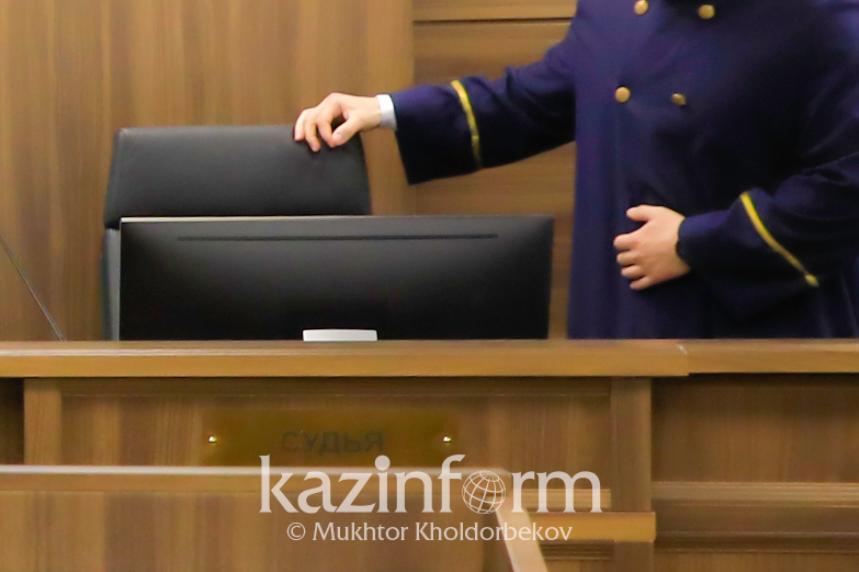ASTANA. KAZINFORM – Starting January 1, 2023, the Constitutional Court began its work in Kazakhstan, an initiative spearheaded by President Kassym-Jomart Tokayev in his address to the nation on March 16, 2022. The court was established with the idea of expanding human rights mechanisms by giving citizens an opportunity to appeal directly to the court. More about the court and its specifics is in the latest article of Kazinform.
The Constitutional Court is not a novelty for Kazakhstan. It first emerged in Kazakhstan, when the country adopted its first Constitution in January 1993, but was dissolved with the 1995 Constitution with the establishment of the Constitutional Council. Still, experts agreed that the court had greater competence.
«It is important to emphasize that unlike the Constitutional Court, which was abolished back in 1995, the current highest constitutional body of the country is likely to take into account the need to simplify the organizational and procedural issues that burdened the judicial process earlier,» said Mukhit Asanbayev, chief researcher at the Kazakhstan Institute for Strategic Studies (KazISS).
Addressing the nation on March 16, President Tokayev pointed out that most countries of the world have the Constitutional Court, «where everyone can send the appropriate requests.»
Photo: akorda.kz
«Experts agree that its activities are more effective in ensuring compliance with the provisions of the Basic Law. Given these circumstances, I propose to establish a Constitutional Court. The Prosecutor General and the Human Rights Ombudsperson should also be granted the right to appeal to the Constitutional Court,» he said, highlighting the paramount importance of the Constitutional Court having the supreme legal force and being the basis of the country’s entire legal system.
The norm on the court was part of the amendments voted for at the national referendum on June 5, 2022. Tokayev signed the law on the Constitutional Court on November 5, 2022, among other laws stemming from the national referendum.




Photo: akorda.kz
Composition of the Constitutional Court
The Constitutional Court of Kazakhstan is meant to ensure the supremacy of the Constitution on the entire territory of Kazakhstan. In exercising its powers, the Constitutional Court shall be independent of citizens, organizations, state bodies, and officials.
The Constitutional Court consists of 11 judges. Four of them, including a deputy chairperson, are appointed by the President. The President also appoints the chairperson.
The Senate, an upper chamber of the Kazakh Parliament, appoints three judges of the Constitutional Court, and the Majilis, a lower chamber of Parliament, appoints three judges.

According to the law, a judge of the Constitutional Court cannot concurrently be a deputy, hold other paid positions, except teaching, scientific or other creative activity, carry out an entrepreneurial activity, or be a member of a governing body or supervisory board of a commercial organization.
The chairperson and judges of the Constitutional Court cannot be members of political parties or trade unions or advocate for any political party.
Who are the judges?
The Constitutional Court began to perform its duties on January 1, 2023. Judges of the Constitutional Court took an oath on January 9.
President Tokayev appointed Elvira Azimova as the Constitutional Court chairperson. Before the appointment, she served as the country’s Human Rights Ombudsperson. With vast experience in law and human rights, Azimova also served as deputy justice minister from 2013 to 2019.
President Tokayev appointed Kairat Zhakipbayev, Aizhan Zhatkanbayeva, Bakyt Nurmukhanov and Roman Podoprigora. On January 10, Bakyt Nurmukhanov was appointed deputy chairperson of the court.
The Senate of Parliament appointed Aigul Kydyrbayeva, Asan Eskendirov and Yerlan Sarsembayev and the Mazhilis appointed Kanat Musin (former minister of justice), Yerkin Ongarbayev and Sergey Udartsev.

Photo: gov.kz
President Tokayev met with the judges on January 4, stressing strict and steadfast adherence to the norms of the Constitution.

Photo: akorda.kz
«Kazakhstan prioritizes ensuring the protection of constitutional rights of the citizens. The public is ready to take an active part in it. That is why I suggested establishing the Constitutional Court,» he said.

Photo: akorda.kz
«We will do our best to justify the trust placed in us, the expectations of the society and the needs of the state,» said Azimova at the meeting.

Photo: akorda.kz
What is the process of appealing to the Court?
According to the law, the Court allows citizens to challenge laws and decisions that do not comply with constitutional law, thereby giving them an opportunity to protect their rights.
Citizens can question the compliance of normative legal acts that directly affect their rights and freedoms compliance with the Constitution of Kazakhstan.

A citizen’s appeal will be accepted if the disputed law or other normative legal act has been applied by the court or directly affects the rights and freedoms in a particular case with the participation of a citizen and a judicial act has been issued in the case that entered into legal force.

The Constitutional Court has at most five working days to decide whether it accepts or refuses to accept an appeal to constitutional proceedings and then a month to consider the request and make a final decision. At the same time, the final decision on the citizens’ appeals is made within three months since entering constitutional proceedings.


Independence and immunity of Constitutional Court judges
The law grants Constitutional Court judges independence in their work, as they are subordinate only to the Constitution of Kazakhstan and the constitutional law. The law also indicates that any interference in their activity and exertion of pressure or other influence on them entails liability by law.

«The judges of the Constitutional Court on constitutional matters shall not be accountable. No one shall have the right to demand from them a report on the exercise of their powers,» reads the law.
During their term of office, judges may not be detained, subject to detention, house arrest, summoning, measures of administrative punishment imposed by a court of law, or arraigned on a criminal charge without the consent of Parliament of Kazakhstan, except in cases of being apprehended on the scene of a crime or committing a grave or especially grave crimes.

What is next?
On January 9, the court started constitutional proceedings based on an appeal from a group of deputies about interpreting article 62 in the Constitution.
»This article assumes that constitutional laws are passed on matters provided for in the Constitution by a majority of at least two-thirds of the total number of deputies in each chamber,«reads the statement from the Constitutional Court.
Preparations for the session of the Constitutional Court that will consider this appeal is underway.
Commenting on the Constitutional Court, Amina Urpekova, senior researcher at the Department of Political Research of the Kazakh Institute of Strategic Studies, said one of the basic needs of a citizen of any country is justice, protection and guarantee of his or her inalienable rights, which is ensured by observing the principle of the rule of law. The Constitutional Court, according to her, aligns with the nation’s efforts to strengthen the rule of law and accelerate democratization processes.

«The adopted laws significantly expand the opportunities for citizens to protect themselves from any manifestation of lawlessness, violation and infringement of their rights. Thus, people got the right to apply directly to the Constitutional Court with a request to review this or that normative legal act directly affecting their constitutional rights and thus obtain protection,» she said.
Citizens can seek greater protection of their rights from the strengthened powers of the Commissioner for Human Rights and the Prosecutor General, who have significantly expanded their human rights and supervisory functions by appealing to the Constitutional Court on compliance with normative legal acts that affect the fundamental human and civil rights with country’s Basic Law.

«The creation of the Constitutional Court and its integration into the Kazakh political system is an important step in building a balanced system of checks and balances between the three branches of power,» she said.
The re-establishment of the Constitutional Court comes at a time when Kazakhstan finds itself amid a transformation in the political system and the mindset of people becoming more aware of their rights and freedoms. Hopes remain that the court will serve as yet another mechanism to ensure the legality and the rule of law apply equally to the state and the society.
Written by Assel Satubaldina




